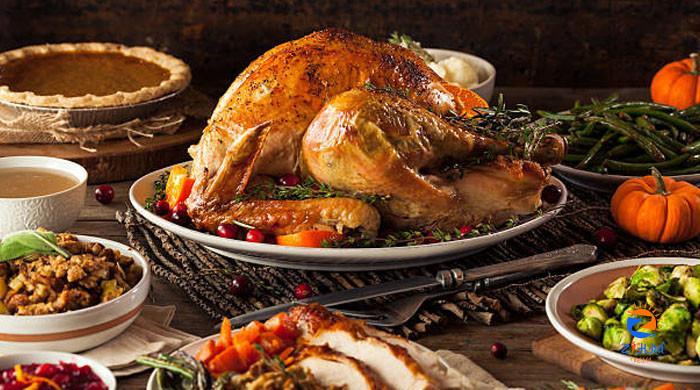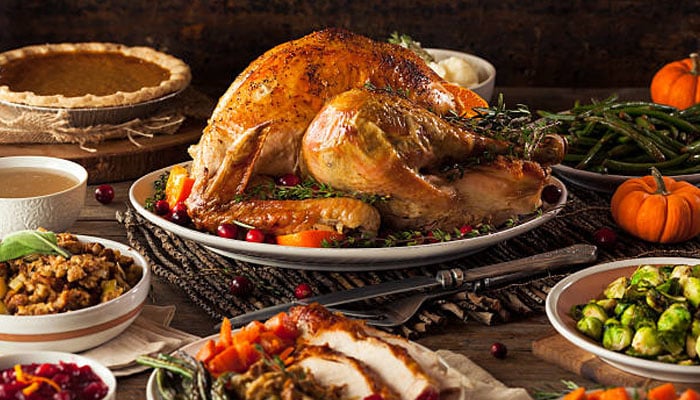
[ad_1]
The main course of many holiday feasts is turkey especially Thanksgiving — the huge bird that is native to North America is called the turkey, or technically Meleagris gallopavo.
But since its flesh is so nutrient-dense and packed with vital vitamins and minerals, it is popular all around the world.
Turkey’s micronutrients can promote immune system health, energy generation, cognitive function, and muscle growth and repair. It also supplies the amino acids required for muscle repair. It has an excellent nutritional profile and provides several health advantages both during and after the holidays.
Healthy source of protein
Amino acids make up protein, which has several functions in the body. It is necessary for many biological processes to function and gives cells structural support.
Protein is essential for the body’s transportation of several nutrients that are involved in energy synthesis, immunological response, and fluid homeostasis.
But the most important function of protein in the body is in the development and maintenance of muscle. Protein sources are necessary for muscle growth since amino acids are sometimes referred to as the building blocks of life.
Turkey is a high-protein food. A 4-ounce (oz) portion of turkey breast contains all nine of the necessary amino acids required for muscular building, and around 27 grammes (g) of protein.
Turkey may be especially helpful for people attempting to reduce weight or gain more lean muscle mass when included in a well-balanced diet.
Furthermore, studies suggest that poultry—including turkey—may provide a better source of protein than their red meat equivalents. Unlike red meat, which has been linked to an increased risk of cancer and cardiovascular disease, turkey is low in fat.
Turkey is a great source of protein for people who have a history of cardiac problems or who are at risk of getting cancer.
Rich in B vitamins
The body’s many important functions depend on B vitamins. Turkey is a good source of vitamins B1 and B2, but it is particularly high in B3, B6, and B12.
Vitamin B3, Also known as niacin, it is necessary for energy synthesis and cell communication. Six Turkey has 11.2 mg of vitamin B33 per 4 oz meal, or 70% of the Recommended Dietary Allowance (RDA).
On the other hand, Vitamin B6 or Pyridoxine is a necessary cofactor in the synthesis of neurotransmitters and amino acids. Turkey contains 0.919 mg of vitamin B6,3 per 4 oz serving, or 54% of the maximum recommended daily allowance.
Nutrition of turkey
Turkey’s nutritional profile is outstanding. This dish is high in nutrients, low in fat and carbs, and high in protein. It also has a variety of vitamins and minerals, which provide a wide range of health advantages.
A 4-ounce portion of turkey breast offers:
Calories: 129
Fat: 1.67 g
Saturated fat: 0.327 g
Sodium: 128 mg
Carbohydrates: 0.158 g
Fiber: 0 g
Added sugars: 0 g
Protein: 26.8 g
Vitamin B3: 11.2 mg
Vitamin B6: 0.919 mg
Vitamin B12: 0.712 mcg
Selenium: 25.7 mcg
Zinc: 1.45 mg
Phosphorus: 227 mg
Turkey can provide a substantial contribution to several daily nutritional demands, as was previously indicated.
Moreover, because it is a lean protein source, it can promote general health and weight management objectives without consuming excessive amounts of calories.
Risks of eating turkey
While turkey is a good source of protein, those with certain dietary needs or preferences should think about other options. Health is directly impacted by diet, as it affects several bodily systems.
For instance, gout sufferers may need to limit their consumption of turkey since studies have indicated that fowl might raise uric acid accumulation, which is a risk factor for the excruciating disease. The protein and mineral content must be digested by the kidneys, therefore people with impaired renal function may also need to watch how much they eat.
It’s also critical to understand the preparation process for turkey. A lot of store-bought foods have a lot of salt, which can raise the risk of heart disease and stroke as well as alter blood pressure.
The 18th Centres for Disease Prevention and Control. Consumption of Sodium and Health.
A licensed dietitian nutritionist or medical doctor can assist in creating a nutrition care plan that best suits your needs including turkey.
[ad_2]
